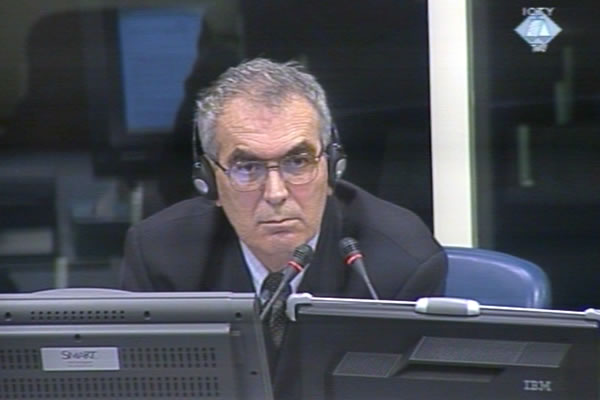Home
TOLIMIR’S DEFENSE EXPERT REPORT REJECTED
Defense expert Ratko Skrbic and his report on movement of the Srebrenica population lack ‘professional foundations’, the Trial Chamber decided at the trial of Mladic’s former assistant in the VRS Main Staff Zdravko Tolimir, charged with genocide and other crimes in Srebrenica and Zepa. The decision was taken by a majority vote
 Ratko Skrbic, defence witness of Zdravko Tolimir
Ratko Skrbic, defence witness of Zdravko Tolimir The expert report of VRS colonel Ratko Skrbic entitled Movements of the Population in Srebrenica will not be admitted into evidence at the trial of Zdravko Tolimir, Mladic’s former assistant for intelligence and security in the VRS Main Staff. The Trial Chamber with the German judge Fluegge presiding reached the decision with a majority of votes. Judge Nyambe, of Zambia, presented her dissenting opinion and Congolese judge Mindua appended his separate opinion.
According to Ratko Skrbic’s calculations, after the fall of Srebrenica there was a ‘deficit’ of 368 persons who went ‘missing, or were killed or executed’. Skrbic contended that this refutes the prosecution’s allegation about more than 7,000 victims. The prosecutor described Skrbic’s report as ‘partial, incompetent and an insult to the Srebrenica victims’ and asked the judges to reject it. Tolimir on the other hand argued that Skrbic did have the requisite qualifications and that he managed to ‘make his calculations without denying the crimes’.
In their decision to reject Skrbic’s report, the judges remind the prosecution of its duty to prove the responsibility of the accused beyond reasonable doubt by calling evidence based on ‘the professional analyses of qualified experts’. To contest such evidence and cast doubt on the allegations against the accused, the defense case must have the same sound professional basis, the judges noted. In this case, both the author and his report lack the professional foundations, the judges concluded with the majority of votes. ‘Scarce sources of information’ and the ‘obviously partiality’ in their selection indicate that ‘a lay person could draft such a report using the data already in evidence’.
Numerous methodological deficiencies and the witness’s lack of qualifications, combined with his obvious personal concern, have led the majority to conclude that his report, Movements of the Population in Srebrenica, lacked reliability and evidentiary value and could not be admitted into evidence.
Judge Nyambe, of Zambia, presented a dissenting opinion. In Judge Nyambe’s opinion, Skrbic’s report was relevant and should be admitted into evidence. The defense expert has the requisite expertise to produce a report on the movement of the population because he was a high-ranking officer in the Yugoslav and Bosnian Serb army, where he gained the necessary ‘knowledge, skills, experience and qualifications in the domain of the movements of the population during the war’, Judge Nyambe noted.
Linked Reports
- Case : Tolimir - "Srebrenica"
- 2012-02-15 PARTIES REST THEIR CASES AT ZDRAVKO TOLIMIR’S TRIAL
- 2012-02-14 PROSECUTOR: DEFENSE EXPERT IS ‘INCOMPETENT AND PARTIAL’
- 2012-02-09 ‘CALCULATION’ TO CONTEST NUMBER OF SREBRENICA VICTIMS
- 2012-08-21 PROSECUTION SEEKS LIFE IMPRISONMENT FOR ZDRAVKO TOLIMIR
- 2012-08-22 TOLIMIR DENIES RESPONSIBILITY FOR CRIMES IN SREBRENICA AND ZEPA
- 2012-08-23 TOLIMIR ASKS FOR AQUITTAL
